BitTorrent or P2P protocols are the best means to transfer large files over the distance, without contributing much load on any centralized environment. Millions of People use p2p protocols to transmit files of their needs.
BitTorrent is branded as a peer-to-peer technology, but despite this label the downloading process still relies heavily on central servers. In the first place, there are the BitTorrent search engines and indexes such as The Pirate Bay and isoHunt. These are needed to search for content and to grab the .torrent file one needs to download a file.
Besides these torrent sites, most BitTorrent downloads are still managed by so-called trackers. These servers coordinate the download process and make sure that people can find others who are sharing the files they want to download. To a certain degree, trackers are no longer needed with ‘trackerless’ technology such as DHT, but even DHT often uses a central server to get a torrent started.
Finally, central servers are used by moderators to help hunt spam and malware. All file sharing programs without such central checking have become practically useless over time.
In the last year these ‘central server’ vulnerabilities have caused a number of minor inconveniences for torrent users. When trackers go offline, downloads usually slow down or may stop entirely, and when a torrent search engine such as The Pirate Bay has technical issues, users have to search for alternatives.
While the file-sharing ecosystem is currently filled with uncertainty and doubt, researchers at Delft University of Technology continue to work on their decentralized BitTorrent network. Their Tribler client doesn’t require torrent sites to find or download content, as it is based on pure peer-to-peer communication.
“The only way to take it down is to take the Internet down,” the lead researcher says.
Introduction
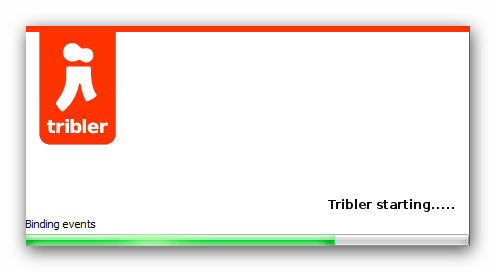 Tribler is an open source peer-to-peer client with various features for watching videos online. The user interface of Tribler is very basic and focused on ease of use, instead of including features. Tribler is based on the BitTorrent protocol and uses an overlay network for content searching. Due to this overlay network Tribler does not require an external website or indexing service to discover content. Tribler features include: video-only searching, experimental video streaming, and an integrated video player. Tribler is available for Linux, Windows and Mac OS X.
Tribler is an open source peer-to-peer client with various features for watching videos online. The user interface of Tribler is very basic and focused on ease of use, instead of including features. Tribler is based on the BitTorrent protocol and uses an overlay network for content searching. Due to this overlay network Tribler does not require an external website or indexing service to discover content. Tribler features include: video-only searching, experimental video streaming, and an integrated video player. Tribler is available for Linux, Windows and Mac OS X.
The name Tribler stems from the word Tribe, referring to the usage of social networks in this P2P client. The first version of Tribler was a small enhancement on the ABC (Yet Another BitTorrent Client)
Features
Tribler adds keyword search ability to the BitTorrent file download protocol using a gossip protocol, somewhat similar to the eXeem network which was shut down in 2005. The software includes the ability to recommend content. After a dozen downloads the Tribler software can roughly estimate the download taste of the user and recommends content. This feature is based on collaborative filtering, also featured on websites such as Last.fm and Amazon.com. Another feature of Tribler is a limited form of social networking and donation of upload capacity. Tribler includes the ability to mark specific users as online friends. Such friends can be used to increase the download speed of files by using their upload capacity. Due to these features Tribler differs from other popular BitTorrent clients such as Vuze and µTorrent.
The tribler offers some basic and advanced features which you can’t find on your current torrent client. Ofcourse it could be the future file transfer protocol adopted by the current p2p users.
Settings window
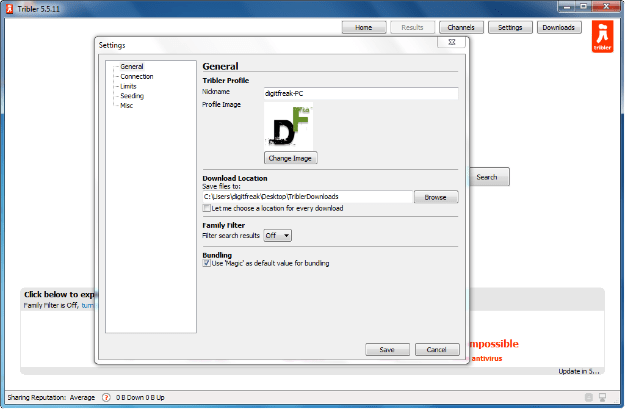 The “settings” windows offers very basic and useful option which could be helpful while using the client. It is the place where you can add your user profile and enjoy online identity.
The “settings” windows offers very basic and useful option which could be helpful while using the client. It is the place where you can add your user profile and enjoy online identity.
Search listing & downloads
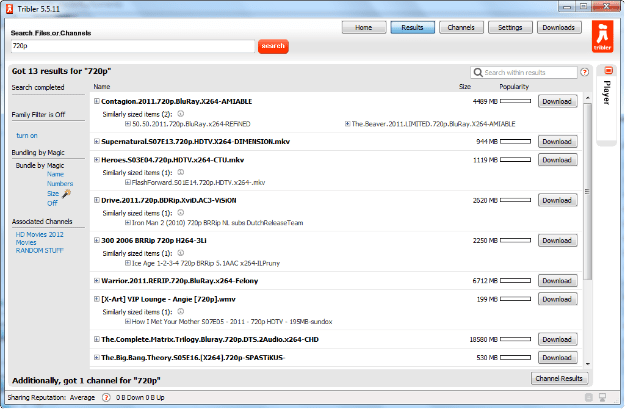 Tribler offers search listing of your queries which works on different mechanism of other torrent websites. It doesn’t relies on the centralized server to perform its queries, rather it can retrieve the data and .torrent files from other peers connected to your client. To get the most relevant and most relevant result you must keep your client running for at least 5 minutes before performing the search query, as the client connects to other peers and maintains an index while it is running, which can further help you get the most relevant search results of your desired destination.
Tribler offers search listing of your queries which works on different mechanism of other torrent websites. It doesn’t relies on the centralized server to perform its queries, rather it can retrieve the data and .torrent files from other peers connected to your client. To get the most relevant and most relevant result you must keep your client running for at least 5 minutes before performing the search query, as the client connects to other peers and maintains an index while it is running, which can further help you get the most relevant search results of your desired destination.
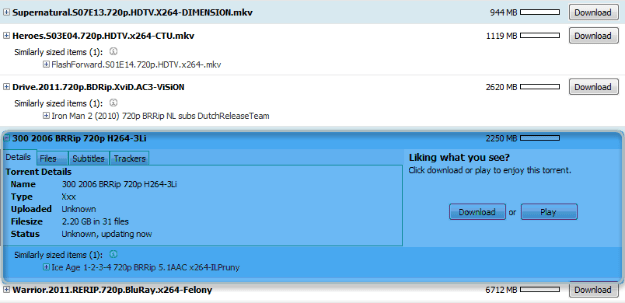 The download process if very easy and is performed on the fly, downloading a torrent file was never so easy. You just need to click on the name of the file you want to download in your search results and information related to the file will slide in right below the name, where you can find all the relevant information about the file right inside your client. You’ll find download button after each filename, clicking on which download starts automatically and tribler will download .torrent meta file from other peer on the network and start your download.
The download process if very easy and is performed on the fly, downloading a torrent file was never so easy. You just need to click on the name of the file you want to download in your search results and information related to the file will slide in right below the name, where you can find all the relevant information about the file right inside your client. You’ll find download button after each filename, clicking on which download starts automatically and tribler will download .torrent meta file from other peer on the network and start your download.
Channels
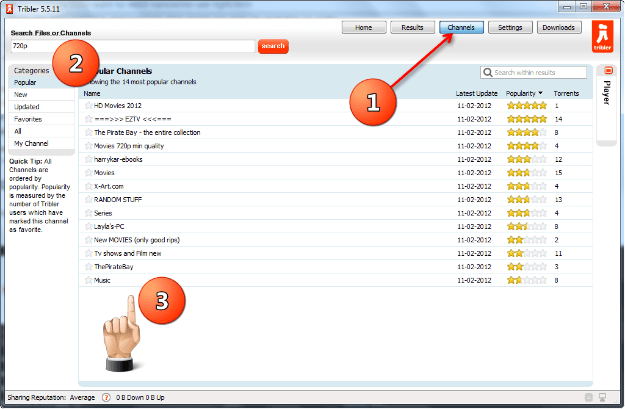 This is the features, which makes me happy. It is not much of the useful thing atm, but soon, when other users will start listing the torrent files which they find useful for them on their own profile, it will be the best thing on the client or any other p2p software out there.
This is the features, which makes me happy. It is not much of the useful thing atm, but soon, when other users will start listing the torrent files which they find useful for them on their own profile, it will be the best thing on the client or any other p2p software out there.
Users can list down the torrents they like or think they should recommend to others to their channels and people on the network using tribler can view or download the files from it.
For example you can look for eztv channel and can crawl to the torrents listed by them at one place. just go to the channel and click on the download button right beside the torrent name you can want to download.
SwarmPlayer
The SwarmPlayer is a Python based BitTorrent Internet TV viewer. It allows you to watch BitTorrent-hosted peer-to-peer digital media distribution of video on-demand and plays live Tribler streaming media. It is based on the same core as the Tribler TV application.
The core software is free and open-source software based on the Tribler platform, licensed under the LGPL 2.1.
Development
Tribler was created by university researchers trying to improve peer-to-peer technology. Tribler is designed to enhance BitTorrent by removing the need for central elements such as the websites for finding content. The aim is to increase performance, reliability, and scalability.
The Tribler BitTorrent client is no newcomer to the BitTorrent scene. It has been in development for more than 5 years and has delivered many innovative features, which have mostly been ignored by the masses.
What is it all about?
Today, however, Tribler is more relevant than ever before.
Developed by a team of researchers at Delft University of Technology, the main goal is to come up with a robust implementation of BitTorrent that doesn’t rely on central servers. Instead, Tribler is designed to keep BitTorrent alive, even when all torrent search engines, indexes and trackers are pulled offline.
“Our key scientific quest is facilitating unbounded information sharing,” Tribler leader Dr. Pouwelse tells TorrentFreak.
“We simply don’t like unreliable servers. With Tribler we have achieved zero-seconds downtime over the past six years, all because we don’t rely on shaky foundations such as DNS, web servers or search portals.”
So how does it work?
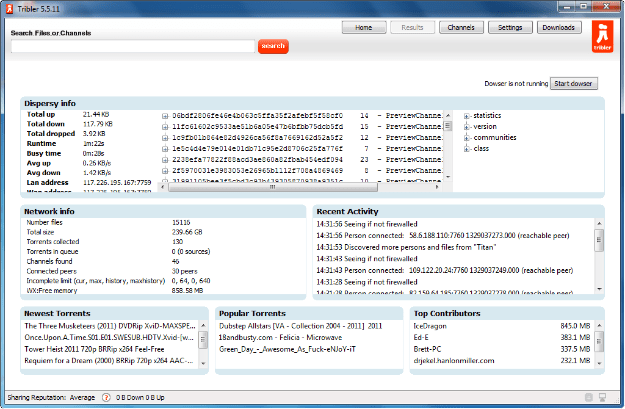 Like many other BitTorrent clients, Tribler has a search box at the top of the application. However, the search results that appear when users type in a keyword don’t come from a central index. Instead, they come directly from other peers.
Like many other BitTorrent clients, Tribler has a search box at the top of the application. However, the search results that appear when users type in a keyword don’t come from a central index. Instead, they come directly from other peers.
Downloading a torrent is also totally decentralized. When a user clicks on one of the search results, the meta-data is pulled in from another peer and the download starts immediately. Tribler is based on the standard BitTorrent protocol and uses regular BitTorrent trackers to communicate with other peers. But, it can also continue downloading when a central tracker goes down.
The same is true for spam control. Where most torrent sites have a team of moderators to delete viruses, malware and fake files, Tribler uses crowd-sourcing to keep the network clean. Content is verified by user-generated “channels”, which can be “liked” by others. When more people like a channel, the associated torrents get a boost in the search results.
The latest addition to Tribler is a Wikipedia-style editing system dubbed “Open2Edit,” where users have the option to edit names and descriptions of torrents in public channels. All without a central server, totally decentralized.
According to Dr. Pouwelse, Tribler is fully capable of resisting any pressure from outside, and it will still work when all torrent sites and trackers are gone. It simply can’t be shut down, blocked or censored, whatever laws politicians may come up with.
One thing that could theoretically cause issues, is the capability for starting users to find new peers. To be on the safe side the Tribler team is still looking for people who want to act as so-called bootstrap Tribler peers. These users will act as super peers, who distribute lists of active downloaders.
“Together with software bugs and a code cleanup, that is now our last known weakness,” says Pouwelse.
While the Tribler client only has a few thousand users at the moment, for avid file-sharers it must be a relief to know that it’s out there. No matter what crazy laws may pass in the future, people will always be able to share.
Those who want to give it a spin are welcome download Tribler here. It’s completely Open Source and with a version for Windows, Mac and Linux.
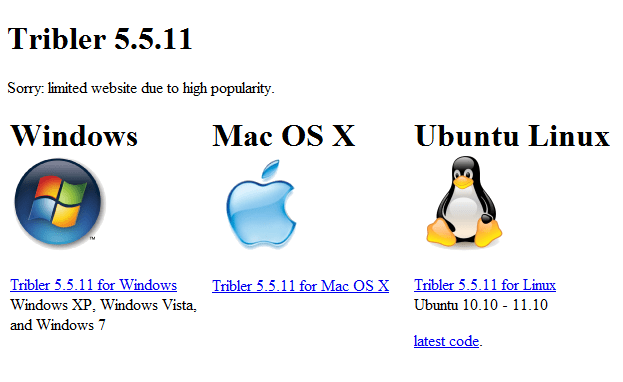
Update: After an article on TorrentFreak and DigitFreak in February 2012 mentioned Tribler’s decentralization and the fact that its index is impossible to take down, the website became hugely popular, causing it to be reduced to just the download page to comply with demand.
Download: Tibler for cross OS
Source: TorrentFreak, Havard Internet TV, Wikipedia, other sources.
Leave a Reply